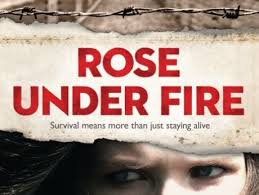Matt Dwyer and Addy Stupin review “Rose Under Fire”

April 7, 2015
Addy’s Take:
Rose Under Fire written by Elizabeth Wein is a historical fiction novel, set during World War II, which follows a young American volunteer pilot, Rose Justice, after she is captured and sent to the infamous concentration camp Ravensbrück. Against this horrific backdrop, Rose comes to know an incredible and interesting cast of women, with whom she bonds. Through the women’s friendship, they are able to support and
help one another.
Rose Under Fire is a companion novel to Wein’s earlier novel Code Name Verity, which received critical acclaim and was awarded the Michael L. Printz Honor Award, the Golden Kite Honor Award, and the Edgar Allan Poe Award for Best Young Adult Novel, all for the year 2013. Despite not having read the preceding novel, I was still able to comprehend and value the book.
Although I found the first person point-of-view initially very off-putting, I still enjoyed this book. The era and historical context behind this book were fascinating and despite the author’s descriptions of unimaginable horrors faced in the concentration camps, the novel was able to ultimately come across as uplifting. The power of this book was heightened by the aspects of truth and history weaved into the fictitious narrative. While I didn’t entirely love the style of this novel, I could still appreciate it and would recommend it to those interested in World War II and the horrors that occurred during the time period.
Matt’s Take:
Rose Under Fire by Elizabeth Wein is about an American pilot Rose Justice during World War II. Because the novel is told from Rose’s journal entries, the book makes you feel like you are reading an artifact from the time, making the heart wrenching story that much more real. As Rose is captured and put into the infamous women’s POW camp Ravensbruck, the friendships she forges ultimately challenge her to do the right thing and persevere against the impending threat of extermination. The loyal companions represent the wide variety of prisoners at Ravensbruck, from many different countries. They also have sustained many different injuries, and provide a platform for the author to expose how prisoners were experimented on, permanently debilitated. The diversity of Rose’s friends leaves a profound effect on the reader who becomes emotionally attached to the characters as they endure unthinkable tragedies.
Rose’s friends make sacrifices to preserve their dignity, inspiring Rose to fight for her cause. I felt like I was rallying around them through their acts of rebellion. The characters that die in the camp make Rose contemplate her own mortality and treasure her chances to escape and avenge them. Later in life, Rose herself compels her fellow survivors to find purpose in their lives, and they convince her to stand up for herself. These characters complete the novel, complimenting Rose’s insecurities and leaving the reader awed at their perseverance.
Rose writes poetry as an outlet throughout the book, before, during, and after her time in the camp. I think her poems are a great addition to the text and giving a foreboding feeling by surreally portraying the war’s gruesome occurrences. They give a fresh angle for viewing phenomena in the book: a plane crashing, the monotony of the camp, and resonate deeply with the reader.
I highly recommend this book and give it four out of five stars.

































